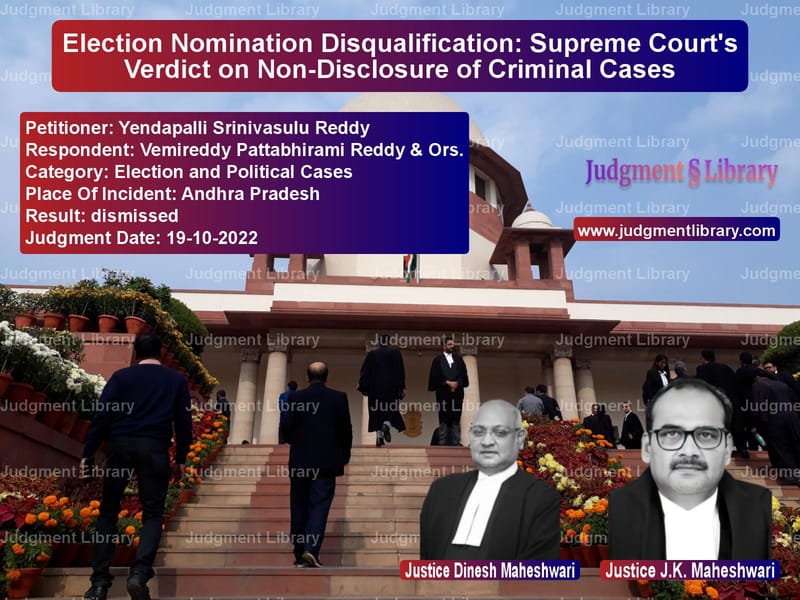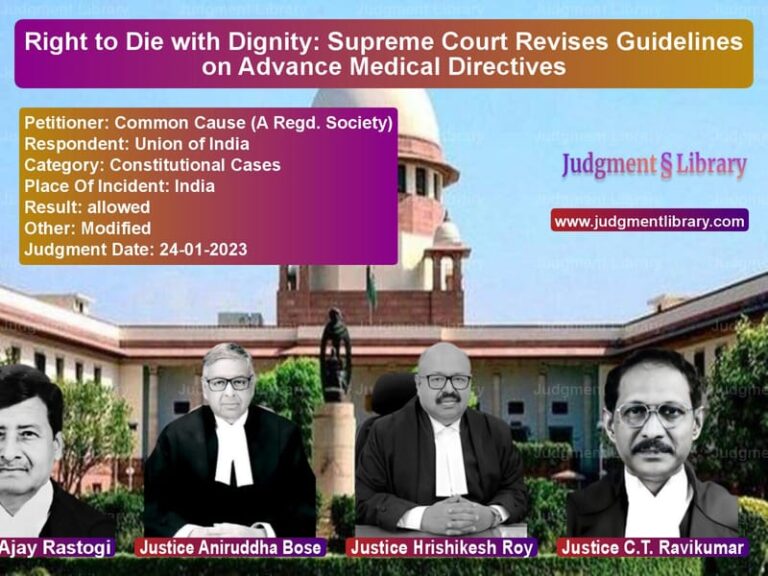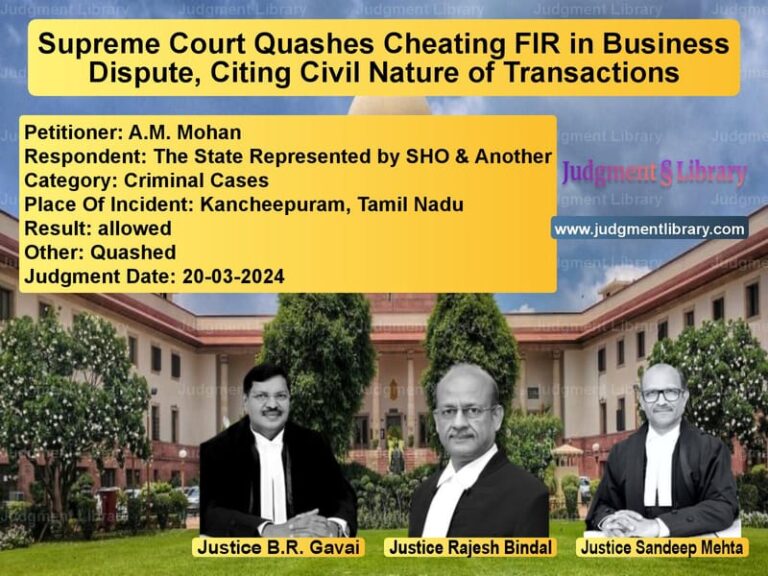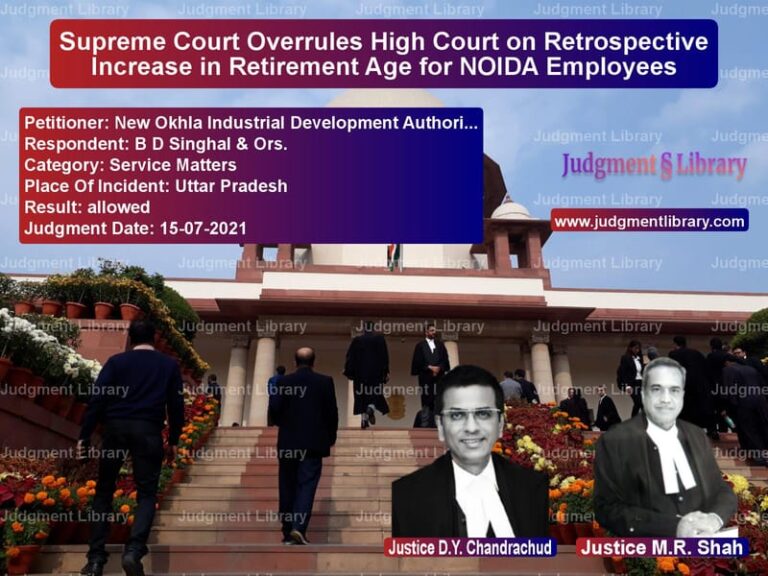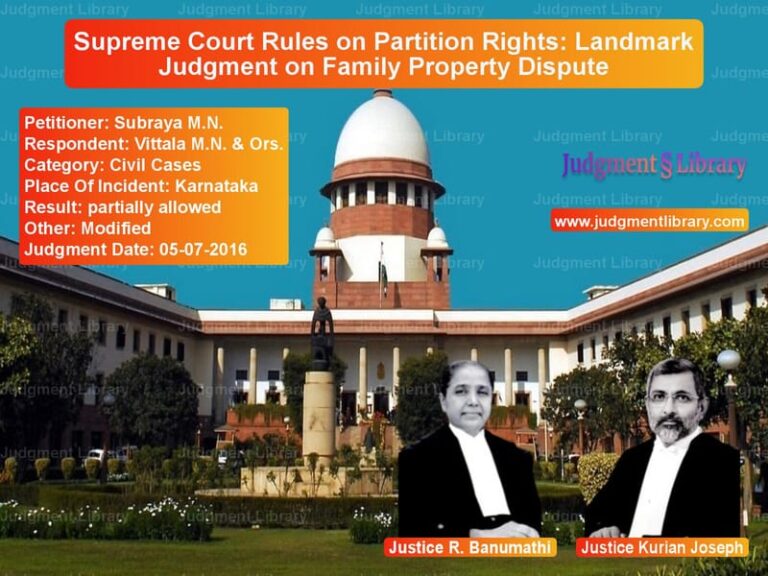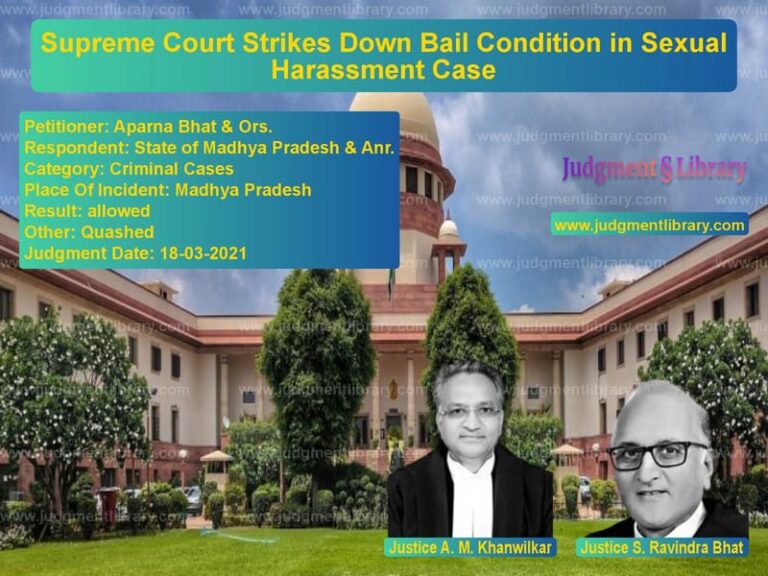Election Nomination Disqualification: Supreme Court’s Verdict on Non-Disclosure of Criminal Cases
The Supreme Court of India, in the case of Yendapalli Srinivasulu Reddy v. Vemireddy Pattabhirami Reddy & Ors., dealt with an important question regarding election laws and the necessity of full disclosure of criminal records by candidates. The case revolved around whether an election petition could be amended to introduce allegations that a candidate had failed to disclose pending criminal cases in their affidavit, thereby violating the Representation of the People Act, 1951. The ruling has set a precedent on how courts view such amendments and the necessity of maintaining electoral integrity.
The case primarily arose from the election of the appellant, Yendapalli Srinivasulu Reddy, which was challenged by the respondent, Vemireddy Pattabhirami Reddy, on grounds of improper acceptance of nomination. The election petitioner alleged that the appellant had failed to disclose his pending criminal cases in the affidavit required to be submitted along with his nomination papers. When the petitioner sought to amend the election petition to include this new ground, the appellant objected, arguing that such an amendment was impermissible beyond the limitation period for filing an election petition. The High Court allowed the amendment, leading to an appeal before the Supreme Court.
Background of the Case
The election in question was conducted on 21st March 2017. The respondent filed Election Petition No. 1 of 2017 before the High Court of Andhra Pradesh, challenging the appellant’s election on the grounds of improper acceptance of nomination. The primary allegations were:
- The appellant’s nomination paper suffered from substantial defects and should not have been accepted.
- There was improper rejection of valid votes and improper acceptance of invalid votes.
On 27th March 2018, the respondent filed an application for amendment, arguing that the appellant had failed to disclose a criminal case pending against him in the affidavit submitted under Form 26. The proposed amendment alleged that the appellant had been charged with offenses punishable by imprisonment of two years or more and had deliberately omitted this information to mislead voters.
Petitioner’s Arguments
The respondent (election petitioner) contended that the appellant was legally required to disclose details of any criminal cases in which charges had been framed against him. The key points raised were:
- As per Section 33A of the Representation of the People Act, 1951, a candidate must disclose any criminal cases where charges have been framed.
- The appellant failed to mention that he was an accused in Crime No. 188/2011 registered at Gudur Rural Police Station, Nellore District.
- The court had taken cognizance of the offense in C.C. No. 370/2012, and charges had been framed before the date of filing the nomination.
- The appellant had been convicted under several sections of the IPC, including Sections 143, 147, 148, 447, 290, and 332 read with 149 IPC, on 12th January 2018.
- The omission of this information rendered the affidavit defective and amounted to misrepresentation, affecting voters’ ability to make an informed choice.
- The election result should be declared void under Section 100(1)(d)(i) of the Representation of the People Act, 1951, as it was materially affected by the improper acceptance of nomination.
Respondent’s Arguments
The appellant opposed the amendment on multiple grounds, asserting:
- The amendment sought to introduce a new ground of challenge beyond the limitation period for filing an election petition.
- Omissions in the affidavit were not intentional and did not materially affect the election outcome.
- Under Section 86(5) of the Representation of the People Act, no new corrupt practice could be introduced beyond the original pleading.
- The amendment amounted to an indirect attempt to bring in a corrupt practice allegation, which was not pleaded in the original petition.
- The alleged non-disclosure pertained to an offense of a petty nature, not serious enough to influence voters’ decision-making.
Supreme Court’s Observations
The Supreme Court analyzed the legal provisions governing election petitions, amendments, and the requirement for full disclosure. The court noted:
- The Representation of the People Act mandates complete disclosure of criminal records to ensure transparency.
- Section 33A(1) of the Act requires candidates to declare all pending criminal cases with charges framed against them.
- The nomination form’s affidavit serves a critical function in enabling voters to make informed decisions.
- Failure to disclose criminal antecedents constitutes a suppression of material facts, which can impact the election outcome.
The court cited its own ruling in Krishnamoorthy v. Sivakumar & Ors. (2015), where it held:
“Concealment or suppression of criminal cases deprives voters of their fundamental right to know about their candidate and can be construed as undue influence.”
Final Verdict
After considering the arguments, the Supreme Court upheld the High Court’s decision to allow the amendment. The key findings were:
- The election petition initially challenged improper acceptance of nomination, and the amendment merely elaborated on this ground.
- The amendment did not introduce a new corrupt practice but reinforced an existing challenge.
- Non-disclosure of criminal antecedents is a serious violation of electoral laws and cannot be ignored.
- The right of voters to make an informed choice is fundamental and overrides procedural objections.
The Supreme Court dismissed the appeal, thereby affirming the High Court’s decision to permit the amendment. The ruling reinforces the necessity for electoral transparency and underscores the importance of complete and truthful disclosures by candidates.
Petitioner Name: Yendapalli Srinivasulu Reddy.Respondent Name: Vemireddy Pattabhirami Reddy & Ors..Judgment By: Justice Dinesh Maheshwari, Justice J.K. Maheshwari.Place Of Incident: Andhra Pradesh.Judgment Date: 19-10-2022.
Don’t miss out on the full details! Download the complete judgment in PDF format below and gain valuable insights instantly!
Download Judgment: yendapalli-srinivasu-vs-vemireddy-pattabhira-supreme-court-of-india-judgment-dated-19-10-2022.pdf
Directly Download Judgment: Directly download this Judgment
See all petitions in Public Interest Litigation
See all petitions in Legislative Powers
See all petitions in Fundamental Rights
See all petitions in Judgment by Dinesh Maheshwari
See all petitions in Judgment by J.K. Maheshwari
See all petitions in dismissed
See all petitions in supreme court of India judgments October 2022
See all petitions in 2022 judgments
See all posts in Election and Political Cases Category
See all allowed petitions in Election and Political Cases Category
See all Dismissed petitions in Election and Political Cases Category
See all partially allowed petitions in Election and Political Cases Category

